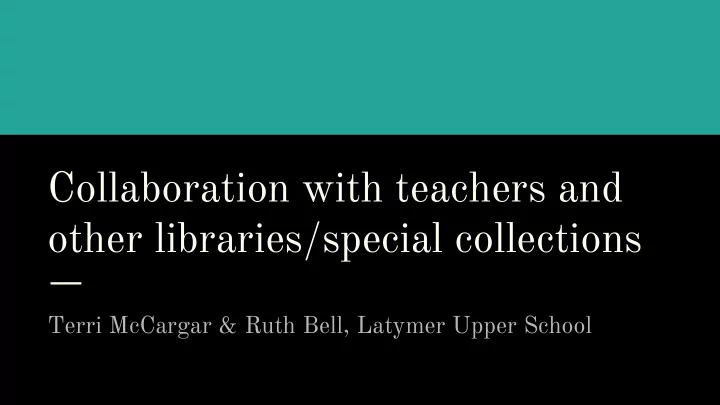

Collaboration with teachers and other libraries/special collections Terri McCargar & Ruth Bell, Latymer Upper School
Pre-U Art History Personal Investigations What is the Personal Investigation? ● 3000- word essay on topic of students’ choice ● Students apply skills and knowledge acquired in other taught papers to a new issue, area, work or body of work where greater depth of analysis is required.
What skills do they need to demonstrate? ● First-hand information is essential. ● Research skills. Candidates must combine analysis of works with references to information gained from their reading and give proof that the bibliography they submit with their work has been read and understood. ● Contextual consideration : where appropriate, candidates must refer to historical, cultural, social, political and economic issues. ● Interpretation of the textual material used : candidates are encouraged to form their own independent judgements based on their reading.
Checklist for a successful PI 1: READING & RESEARCH BIBLIOGRAPHY ❏ Selected relevant material at least 7 books (more if relevant) to include information on: ❏ The general style of Art which your choice of example is in ❏ The artist’s career as a whole and how it developed ❏ The actual artwork you are focussing on . ❏ Specific themes connected to/supporting your argument e.g. medicine; religion; poetry etc. ❏ Any extra research you might need to do about the materials and methods of making ❏ Contemporary art criticism of the time e.g. newspapers.
What are the challenges? ● “There’s nothing on my subject.” / “There aren’t any books on my topic.” ● Daunted by open- ended topic: can’t ask friends for help ● Overly reliant on searching online / inexperienced at browsing and the serendipity of discovering something interesting through wider reading ● Knowing how to navigate a book – contents list, indexes, bibliographies, quotes ● Lack skills to evaluate material critically, distinguish academic sources ● Plugging gaps in information ● Asking for help, sometimes - pride/pressure from not being used to needing help ● Balancing an overview with the detailed information needed
First session: in the classroom/Library Librarian leads small sessions demonstrating search strategies, with Teacher input throughout: Start at very beginning: ● Show how to access library catalogue (available remotely?) ● Have some likely topic searches prepared ● Invite suggestions for search terms from their projects and demo “live”– some work better than others and this is useful for them to see too (importance of key words, refining search, “research is messy”)
What do students understand by “key words”???
Other ways to find sources ● Websites (free subject sites - can you link to catalogue?) ● Reading lists - in LMS or through Department ● Other libraries: “Search other sources” feature in Oliver fantastic – can link to other public libraries, British Library, Copac, specialist libraries such as the National Art Library
Websites (via catalogue - not subscriptions)
Other libraries - can you link to these?
Public library results
Searching online subscription sources ● Demo relevant online subscription resources (subject-specific databases, image banks, newspaper archives, JSTOR) ● Any topics with few results in catalogue to revisit online? ● Point out how to evaluate search terms, filter/refine results (including removing results that are citation only/can’t be accessed)
Newspaper/magazine archives online, e.g. InfoTrac from Gale
Same source, but refined
Gale’s topic finder tool helps refine results by visualizing in wheel or tiled results
JSTOR
JSTOR 2: “search within results”
In the Library ● Sessions finish with tour of Library’s art collection (Dewey refresher or possible introduction for some) ● Copies of past Personal Investigations also available for reference in Library and online as PDF (via LMS) ● Time for students to begin research while both Teacher and Librarian on hand.
Second session: visit to National Art Library ● Why go to another library? ● Finding relevant library ● Timing of visit - depends on purpose ● Librarian liaises with special collection to organize trip; Teacher sorts trip form; both accompany the group on visit ● Visit includes a general presentation by NAL Librarian on the collection, then training in the use of the online catalogue ● Time for students to try searching for material for their topic
The results ● Bibliographies - demonstrate breadth of sources used. ● VIVA questions - authenticity ● Good habits of learning and empowered students! Impact on the school library: ● Students learn more about research and how libraries/librarian can support ● Independent research – fantastic prep for Uni ● More respect for library & research process, good example for other students ● Taps into their curiosity and own interests – library collection broader than taught curriculum
Books Barberie, P. (2014). aperture masters of photography- Paul Strand. Philadelphia: Philadelphia Museum of Art. Barberie, P., Bock, A. (2014) Paul Strand- Master of Modern Photography . Philadelphia: Philadelphia Museum of Art. Clarke, G. (1997). The Photograph . Oxford: Oxford Univeristy Press. Dyer, G. (2006). The Ongoing Moment . London: Abacus. Ferguson, N. (2004). Empire . London: Penguin Books Jackson, A. (2013). The British Empire . Oxford: Oxford University Press. Sontag, S. (2008). Susan Sontag On Photogrpahy . London: Penguin Classics. Szegedy-Maszak, A. (2007). Toward a deeper understanding- Paul Strand at work . Gottingen: Steidl Publishers. Warner Marien, M. (2015). Photography Visionaries . London: Laurence King Publishing. Website Barnes, M. (2016, March 11). Paul Strand: Photography and Film for the 20th Century . Retrieved November 14, 2016, from Victoria and Albert Museum: https://www.vam.ac.uk/exhibitions/paul-strand-photography-and-film-for-the-20th-century Department of Photographs. (2004, October). “Paul Strand (1890–1976).” In Heilbrunn Timeline of Art History. Retrieved November 13, 2016, from The Metropolitan Museum of Art: http://www.metmuseum.org/toah/hd/pstd/hd_pstd.htm
Other libraries Public libraries? Academic libraries? Other specialist collections - for example: https://docs.google.com/document/d/1TFbBPjAW4G9xPjEF0-veViJAjxAwPhIr6O-Htnjuxqc/edit?usp=sharing
Questions?
Recommend
More recommend